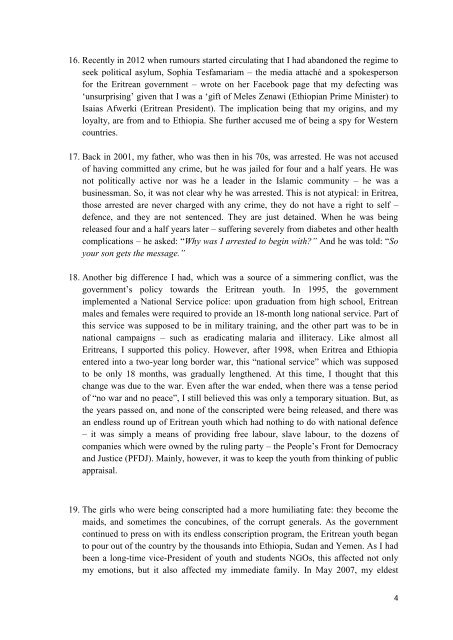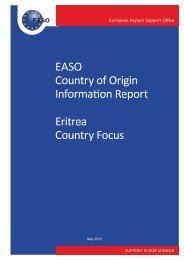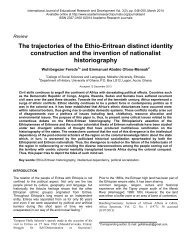Ali-Abdu-testimony
Ali-Abdu-testimony
Ali-Abdu-testimony
Create successful ePaper yourself
Turn your PDF publications into a flip-book with our unique Google optimized e-Paper software.
16. Recently in 2012 when rumours started circulating that I had abandoned the regime to<br />
seek political asylum, Sophia Tesfamariam – the media attaché and a spokesperson<br />
for the Eritrean government – wrote on her Facebook page that my defecting was<br />
‘unsurprising’ given that I was a ‘gift of Meles Zenawi (Ethiopian Prime Minister) to<br />
Isaias Afwerki (Eritrean President). The implication being that my origins, and my<br />
loyalty, are from and to Ethiopia. She further accused me of being a spy for Western<br />
countries.<br />
17. Back in 2001, my father, who was then in his 70s, was arrested. He was not accused<br />
of having committed any crime, but he was jailed for four and a half years. He was<br />
not politically active nor was he a leader in the Islamic community – he was a<br />
businessman. So, it was not clear why he was arrested. This is not atypical: in Eritrea,<br />
those arrested are never charged with any crime, they do not have a right to self –<br />
defence, and they are not sentenced. They are just detained. When he was being<br />
released four and a half years later – suffering severely from diabetes and other health<br />
complications – he asked: “Why was I arrested to begin with” And he was told: “So<br />
your son gets the message.”<br />
18. Another big difference I had, which was a source of a simmering conflict, was the<br />
government’s policy towards the Eritrean youth. In 1995, the government<br />
implemented a National Service police: upon graduation from high school, Eritrean<br />
males and females were required to provide an 18-month long national service. Part of<br />
this service was supposed to be in military training, and the other part was to be in<br />
national campaigns – such as eradicating malaria and illiteracy. Like almost all<br />
Eritreans, I supported this policy. However, after 1998, when Eritrea and Ethiopia<br />
entered into a two-year long border war, this “national service” which was supposed<br />
to be only 18 months, was gradually lengthened. At this time, I thought that this<br />
change was due to the war. Even after the war ended, when there was a tense period<br />
of “no war and no peace”, I still believed this was only a temporary situation. But, as<br />
the years passed on, and none of the conscripted were being released, and there was<br />
an endless round up of Eritrean youth which had nothing to do with national defence<br />
– it was simply a means of providing free labour, slave labour, to the dozens of<br />
companies which were owned by the ruling party – the People’s Front for Democracy<br />
and Justice (PFDJ). Mainly, however, it was to keep the youth from thinking of public<br />
appraisal.<br />
19. The girls who were being conscripted had a more humiliating fate: they become the<br />
maids, and sometimes the concubines, of the corrupt generals. As the government<br />
continued to press on with its endless conscription program, the Eritrean youth began<br />
to pour out of the country by the thousands into Ethiopia, Sudan and Yemen. As I had<br />
been a long-time vice-President of youth and students NGOs, this affected not only<br />
my emotions, but it also affected my immediate family. In May 2007, my eldest<br />
4






